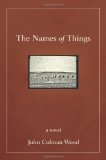Summary | Excerpt | Reviews | Beyond the Book | Readalikes | Genres & Themes | Author Bio

 Book Reviewed by:
Book Reviewed by:
Kim Kovacs
Buy This Book
Elema sat on his stool just outside the door, wrapped in white
muslin cloth, and the ferenji sat on the ground to Elema’s right upon
the stiff skin the boy brought. He wondered where Ali was. Probably
drinking tea at a relative’s tent. Elema’s wife came out with a cup of
tea, which she handed him without a word. He took it, and she went to
unload the camels. As she worked she spoke to a woman in the next
tent over. He listened hard. She told the woman that they had guests.
She asked where the woman’s daughter was and whether all the goats
and sheep had been milked. Elema’s wife ducked into her own tent,
and soon the other woman passed without greeting and entered.
Elema was talking about rain. He did not speak of other things.
The rains were overdue. The time was nearly past. He’d seen white
egrets atop an acacia. Lightning flashed over the northern highlands.
The animals were weak. Some were unable to make the widening
journey between wells and pasture. They were dying, and the prices
traders paid for goats and sheep were as low as Elema remembered.
If only it would rain, Elema said, everything would be all right.
Not everything, he thought.
But Elema probably didn’t mean everything.
He missed details and nuances. For instance, he could not hear
irony. Didn’t know if they used it. He responded to what Elema and
others said, echoed their verbs as they spoke, like a good listener, but
without full understanding. His language wasn’t good enough. Never
had been. He moved through their world like a partially deaf man,
reading lips, catching facts, guessing at meanings. It was only after
much repetition, hearing different people in different contexts, that he
put things together, piecemeal, an archaeologist assembling a broken
vase from shards.
Elema did not speak of Abudo.
Elema asked the man about his home. How was his wife? Why
hadn’t she come with him? Had God given them children? Had he
finished the book he was going to write? Did others know their suffering?
Would they send help?
He answered carefully. He did not explain about her. He did not
know how. What could he say? It wasn’t done.
He said he’d finished the book. Only a few people would read it.
Those who did might speak to others. You never know. He was doubtful.
People over there hardly ever think of people here.
Elema said that was true. When our enemies are far away, we do
not think of them. It is only when they attack and steal our animals that
we think of them.
Elema whispered something into the tent.
They sat then for a while, chewing tobacco, listening to the sounds
of the camp settling. Hushed voices within tents. The unending bleats
and grunts of goats and sheep.
Another man joined them and sat on a stool beside Elema.
He did not recognize the new man, did not remember the voice.
They greeted. The man asked if he was the ferenji who, years ago,
drew water for animals at the wells.
He smiled at the memory. He’d often drawn water, lifting bucket
after bucket from the bottom of the well to the trough. It was work he
could do, work he enjoyed.
He is the one, Elema said.
Elema and the man then spoke of camp matters.
He did not follow it all, something about a family’s troubles, the
result of drought.
They spoke in shorthand, with too much shared knowledge and
too many idioms that he, after all this time, had lost or never learned.
A woman emerged from the tent with a milking bowl. She stood
before him. He could not see her, only her shape against the night sky.
It was not Elema’s wife, who was smaller.
The woman bent down and held out the bowl.
Ho. Take this.
He accepted the bowl with both hands.
Excerpted from The Names of Things by John C Wood. Copyright © 2012 by John C Wood. Excerpted by permission of Ashland Creek Press. All rights reserved. No part of this excerpt may be reproduced or reprinted without permission in writing from the publisher.





The Flower Sisters
by Michelle Collins Anderson
From the new Fannie Flagg of the Ozarks, a richly-woven story of family, forgiveness, and reinvention.

The House on Biscayne Bay
by Chanel Cleeton
As death stalks a gothic mansion in Miami, the lives of two women intertwine as the past and present collide.

The Funeral Cryer by Wenyan Lu
Debut novelist Wenyan Lu brings us this witty yet profound story about one woman's midlife reawakening in contemporary rural China.
Your guide toexceptional books
BookBrowse seeks out and recommends the best in contemporary fiction and nonfiction—books that not only engage and entertain but also deepen our understanding of ourselves and the world around us.